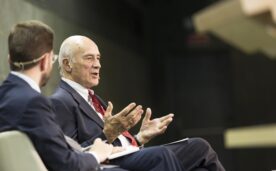Power and Prosperity in the 21st Century: An American Perspective
Summary:
On 9 June 2016, Josep Nye gave a lecture organised by the Rafael del Pino Foundation. In it, Nye, professor of government at the Kennedy School of Harvard University, reviewed the current situation in the United States. Nye pointed out that, if you listen to Donald Trump, it seems that the United States is in decline. Is it really? References to concern about this supposed decline can be found in American history as far back as the 17th century. It also appears in the founding fathers, to take another example. However, if one looks at the country's trajectory, the reality is that it became the world's greatest economic power from the beginning of the 20th century. From then on, the United States began to change its understanding of foreign relations. President Woodrow Wilson, during World War I, broke with isolationism and sent troops to fight in Europe. From then on, he began to conceive of global security with the United States at the centre of the global balance of power. After the Second World War there was a further leap in this trajectory, as the United States moved to station troops outside the country on a permanent basis. At this time, the UK was too weak to continue to play this role, as it had done in the past. The Marshall Plan, the creation of NATO, the Defence Treaty with Japan and participation in the Korean War are examples of the United States becoming a global power. Despite this, a sense of decline continued to pervade American society. In the 1960s, because the Soviet Union launched Sputnik; in the 1980s, because of Japan's industrial success; during the Great Recession, because China stimulated its economy and managed to grow at 10% per year. But what this whole story is about is not American decline, but the psychology of American society. The decline perspective, however, is wrong. First, the United States is the third most populous country in the world, after China and India, and the only developed nation that does not have demographic problems because it is open to immigration. The country is also experiencing an energy revolution, thanks to new oil and gas extraction technologies that make it self-sufficient. Likewise, the US is the epicentre of the technological revolution that is taking place, a revolution that is increasing productivity. The facts, therefore, do not support this perception. What is happening, in reality, has more to do with the psychology of American society, manifested in two ways. First, there is a reaction to globalisation, as in other countries, combined with the job losses caused by the Great Recession, rising inequality and the effects of technological change. Second, there is a history of complaints about immigration as long as immigration itself, even though the arrival of more people is, and has been, an important source of economic growth. Trump appeals to this psychology of Americans when he talks about building a wall between the US and Mexico and having them pay for it. But America's role as a global power is not going to change. Hillary Clinton will most likely be elected president of the country and with her there will be a foreign policy that continues what has been the same throughout the 20th century.
The Rafael del Pino Foundation is not responsible for the comments, opinions or statements made by the people who participate in its activities and which are expressed as a result of their inalienable right to freedom of expression and under their sole responsibility. The contents included in the summary of this conference are the result of the debates held at the meeting held for this purpose at the Foundation and are the responsibility of their authors.
The Rafael del Pino Foundation is not responsible for any comments, opinions or statements made by third parties. In this respect, the FRP is not obliged to monitor the views expressed by such third parties who participate in its activities and which are expressed as a result of their inalienable right to freedom of expression and under their own responsibility. The contents included in the summary of this conference are the result of the discussions that took place during the conference organised for this purpose at the Foundation and are the sole responsibility of its authors.







